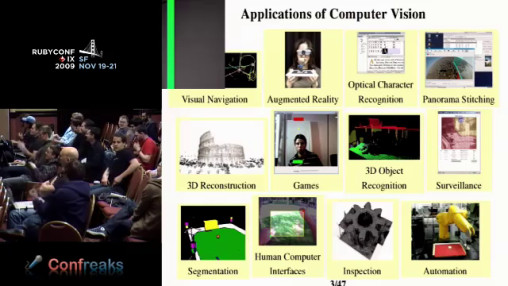02 May 2010

The Free Software Foundation has released a short film about software patents called Patent Absurdity. The film features interviews with Eben Moglen, Karen Sandler, Richard Stallman, Jesse Vincent, and other people involved with the Bilski case.
The Bilski case hopefully will help putting a stop to the rampant practise of patenting applications of mathematics, algorithms, and other abstract concepts to real life problems. To freely quote Bruce Perens (panel discussion at WSIS in Tunis): Mathematics is a field that is discovered - not invented!
See also:
27 Apr 2010
Twinkle is my favourite software for making VoIP calls (under GNU/Linux). Here is how you configure it if you have an account with VoIPTalk.
Configuring the user
Enter your user details. Note that the SIP password is different from the password to log in on the VoIPTalk website. Log in on the VoIPTalk website and click on VoIPtalk ID to view VoIPtalk (SIP) password.

SIP server
Here you enter the details for the outbound proxy.

NAT
For firewall traversal you need to specify a STUN server.

Alternatively you can set up port forwarding on your router. Then you don’t need to specify a STUN server. In any case make sure that your firewall doesn’t block SIP traffic. You can call sip:905@voiptalk.org in order to test whether the configuration works.
I recommend using G.711 u-law as preferred audio codec.
Update:
In Kubuntu 10.04 you have to set all audio devices (input, output, and ringtone) to ALSA/Default.
There is a freeware VoIP client for Microsoft Windows called X-Lite.
See also:
18 Apr 2010
If you are worried about the ash cloud of the current volcano eruption of Iceland, just think about more severe situations such as helicopter landings in the desert. Sand is essentially hard glass (and it melts in turbines of aircrafts leaving a nasty residue). Here’s a video of a helicopter landing in Kuwait.

See also:
20 Jan 2010
I gave a talk titled Computer vision using Ruby and libJIT at the RubyConf 2009 in San Francisco. Confreaks has provided the video now.

You can download the talk from this webpage. The presentation slides are available here.
Let me know if you have any questions.
See also:
12 Jan 2010
This video shows some capabilities of HornetsEye. The video was created with HornetsEye itself. The audio track is Depart by Tekno Eddy.





